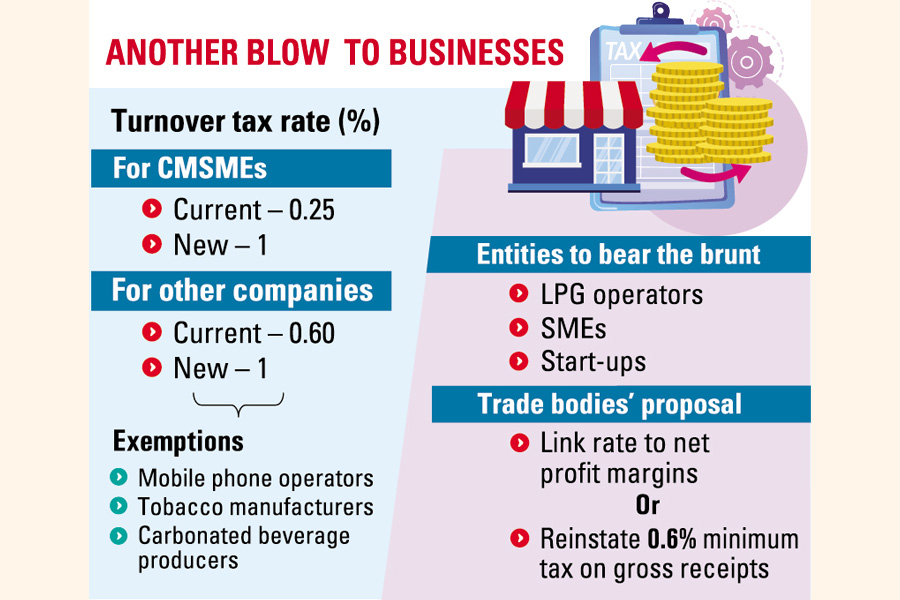
Published :
Updated :

The interim government has decided to move forward with a significant increase in the turnover tax for individual taxpayers operating cottage, micro, small, and medium enterprises (CMSMEs) from the upcoming fiscal year despite strong opposition from business leaders and experts.
From the current 0.25 per cent, the tax rate has been raised to 1.0 per cent.
The decision aligns with recommendations from the International Monetary Fund (IMF) to boost the country's tax-to-gross domestic product (GDP) ratio, according to National Board of Revenue (NBR) sources.
This increase means the taxpayers' gross revenue will be taxed irrespective of business profitability.
Speaking on condition of anonymity, NBR officials said there is no scope for stopping the implementation of the increased tax rate in the FY26 budget.
However, several business associations have proposed alternative measures - either linking the rate to net profit margins or reinstating the previous minimum tax of 0.60 per cent on gross receipts.
NBR sources said the government is under considerable pressure to increase revenue collection in order to secure tranches under the ongoing $4.7 billion IMF loan package.
Meanwhile, the turnover tax rate has also been raised from 0.60 per cent to 1 per cent for all other businesses, regardless of whether they make profits or not.
However, mobile phone operators, tobacco manufacturers, and producers of carbonated beverages will be exempted.
The key sectors likely to be hit hard include distributors, liquefied petroleum gas (LPG) operators, SMEs, and start-ups.
Business leaders and tax analysts have expressed deep concern that the tax rate hike could deal another blow to companies already struggling to survive amid the ongoing economic headwinds.
Speaking to The Financial Express, Dr Masrur Reaz, founder and chairman of Policy Exchange Bangladesh, criticised turnover tax, calling it fundamentally inconsistent with the core principles of income taxation.
"Turnover tax is primarily against the fair principle of income tax, as the authorities impose it even if there is no income," he said. "Income tax should apply strictly to taxable income, not gross revenue."
He urged the government to withdraw the provision, arguing that it places an undue burden on small enterprises.
"Such taxes will eat into their revenues," he added, pointing out that the turnover tax rate is often higher than the applicable income tax rate.
In view of the government's and the IMF's revenue mobilisation targets, Dr Reaz recommended expanding the tax net and increasing administrative capacity rather than enforcing policies that could stifle the growth of small businesses.
Snehasish Barua, a tax analyst and managing director of SMAC Advisory Services, echoed similar concerns.
"Under the Income Tax Act 2023, the average tax rate is 25 per cent. The minimum tax, previously 0.25 per cent of sales, has surged to 1 per cent, effectively making the tax burden 100 per cent of net earnings," he told The Financial Express.
He said distributors, typically sole proprietors, net about 1 per cent of gross sales after expenses.
"This hike will likely push them to demand higher margins from manufacturers or importers, potentially increasing end prices. Ultimately, this change disproportionately impacts compliant taxpayers in an already uneven competitive environment."
Taskeen Ahmed, president of the Dhaka Chamber of Commerce and Industry (DCCI), said the new turnover tax has been introduced at a time when businesses, especially SMEs, are under immense financial strain.
"For the past two and a half years, we have endured relentless shocks - from currency devaluation and the post-Covid-19 slowdown to a prolonged domestic crisis," he stated.
"Genuine businesses are now paying salaries from their own capital. This is not the sign of a healthy economy."
Giving an example, he said, "If I run a Tk 100 crore business and make a loss, the government still demands Tk 1 crore in turnover tax. How is that reasonable?"
"Whether I make a profit or not, I am being forced to pay from my capital. Why punish those who are already compliant?"
Industry insiders said the cost of LPG imports, including the Saudi Aramco contract price (CP), freight, and landing charges, accounts for nearly 90 per cent of the Bangladesh Energy Regulatory Commission (BERC)-regulated retail prices.
Operators are left with a contribution margin of just 10 per cent to cover bottling, distribution, staffing, depreciation, and other fixed costs, while financing costs and currency fluctuations have further eroded profitability in the sector.
Currently, no LPG operator is making a profit. The existing 0.60 per cent turnover tax on gross receipts is already a significant burden, explained insiders.
Businesses are losing equity just to meet the minimum tax obligations as they lack sufficient margins, they said.
Raising the minimum tax on gross receipts from 0.60 per cent to 1 per cent will further erode equity in the sector, which operates under a regulated pricing structure and has no control over international purchase prices, they added.
"To cover the 1 per cent minimum tax, a company must generate a net profit of more than 15 to 20 per cent, something that is virtually impossible for LPG businesses in Bangladesh under the BERC's regulated pricing," an energy expert said.
In a letter to the NBR on June 18, Mohammed Amirul Haque, president of the LPG Operators Association of Bangladesh, stated that the industry has attracted investments of approximately Tk 400 billion and employs thousands.
He warned that increasing the minimum tax from 0.60 per cent to 1 per cent could severely damage the domestic industry unless the sector is exempted.
Mr Haque urged the government to reinstate the previous minimum tax rate to ensure the industry's continued growth and sustainability.
newsmanjasi@gmail.com


 For all latest news, follow The Financial Express Google News channel.
For all latest news, follow The Financial Express Google News channel.